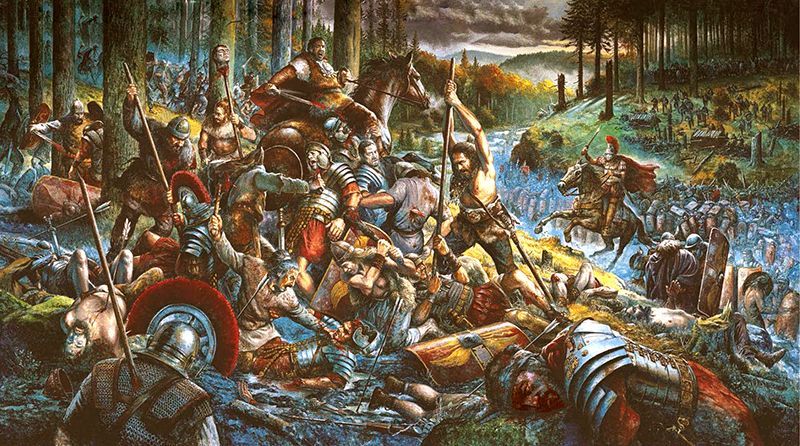The Battle of Teutoburg Forest was a significant military engagement in 9 AD between the Roman Empire and a Germanic coalition led by Arminius. The battle took place in the Teutoburg Forest, near the modern-day city of Osnabrück, Germany, and it resulted in a decisive victory for the Germanic tribes. This battle has been studied extensively by historians and military strategists due to its impact on the Roman Empire and its military tactics.
The Roman Empire, under the command of Publius Quinctilius Varus, was marching through the Teutoburg Forest to suppress a rebellion led by Arminius. Arminius had been trained in Roman military tactics and was serving as an auxiliary officer in the Roman army. However, he had turned against the Romans and was now leading a coalition of Germanic tribes against them. As the Roman army marched through the forest, they were ambushed by the Germanic forces, who had set up traps and hidden themselves in the forest.
The Roman army was caught off guard and suffered heavy losses. The Germanic forces used guerrilla tactics and attacked the Romans from all sides, causing confusion and panic among the Roman troops. The Romans were unable to regroup or establish a defensive line, and they were eventually overwhelmed by the Germanic forces.
The Battle of Teutoburg Forest was a significant defeat for the Roman Empire. It resulted in the loss of three legions and their supporting troops, which amounted to around 20,000 soldiers. This was a significant blow to the Roman military, and it showed that they were vulnerable to guerrilla tactics and ambushes. Additionally, the Romans lost control of the territories east of the Rhine River, which had been conquered by Augustus several years earlier.
The Battle of Teutoburg Forest has been compared to other military campaigns throughout history. One of the most notable comparisons is with the Battle of Cannae in 216 BC, where Hannibal of Carthage defeated a much larger Roman army. Like the Battle of Teutoburg Forest, the Battle of Cannae was a significant defeat for the Romans, and it showed their vulnerability to unconventional tactics. Additionally, both battles were fought in difficult terrain, with the Battle of Cannae taking place on a plain and the Battle of Teutoburg Forest taking place in a forest.
Another comparison that can be made is with the Vietnam War, where the United States suffered a significant defeat due to guerrilla tactics and ambushes. The Vietnam War showed that a technologically advanced army could still be defeated by a less advanced enemy that was familiar with the terrain and used unconventional tactics.
In conclusion, the Battle of Teutoburg Forest was a significant military engagement that had a profound impact on the Roman Empire. It showed their vulnerability to guerrilla tactics and ambushes, and it resulted in the loss of significant territory and troops. The battle has been studied extensively by historians and military strategists, and it has been compared to other military campaigns throughout history, such as the Battle of Cannae and the Vietnam War. Overall, the Battle of Teutoburg Forest serves as a cautionary tale about the dangers of underestimating one's enemy and the importance of understanding the terrain and using appropriate tactics.

Comments